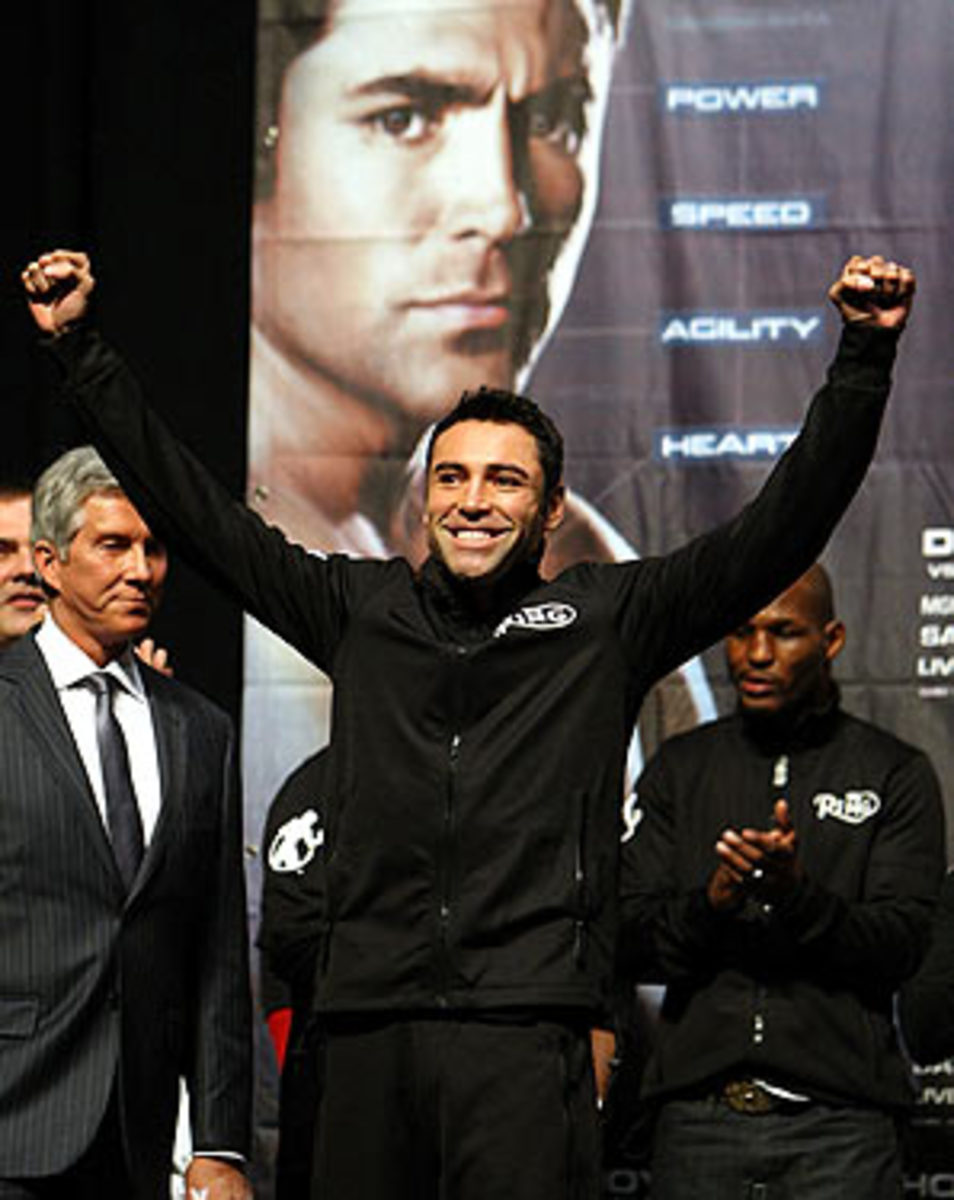De La Hoya left us wanting more
The first time I saw Oscar De La Hoya was at the 1990 Goodwill Games in Seattle. He was just 17, but already a highly touted prospect (back at a time when Americans actually paid attention to amateur boxers). Still, on a U.S. team that included Tim Austen, Shane Mosley, Raul Marquez and super heavyweight Larry Donald, the 126-pound high school kid was far from the only focus. For me that changed somewhere in the first round of his quarterfinal bout against Lee Sang-Hun of Korea.
I still have my reporter's notebook from that day. In it is scrawled LH-bdy!!! -- my abbreviated reaction to a left hook to the body landed by De La Hoya. I'd rarely seen a professional throw a such a withering shot; in the jab-jab-pitter-pat world of amateur boxing a punch like that was unheard of, especially from a smooth-faced high schooler. This one, I thought, could be the real thing.
Nearly two decades later, the kid is 36 and -- if we take him at his word after today's press conference in Los Angeles -- retired, following a 17-year professional career (launched on the glow of his Olympic gold medal in 1992) in which he won 10 world titles in six weight classes, earned as much as or more than any fighter in history and, for the past 10 years at least, reigned as the most popular and acclaimed figure in the sport. All that would seem to vindicate my enthusiastic Seattle scribbling. Why then do I feel a twinge of disappointment?
An honest look back at De La Hoya's 39-6 (30 kayos) professional record (squint a little against the Golden Boy glow) reveals a fighter who, given all his physical potential and seemingly bottomless in-born talent, was never quite as good as he should have been -- or as great as we wanted him to be. He was better than most, of course, and a true terror as a lightweight against over-matched or over-the-hill opponents. (See the bloody mess he made of the great Julio Cesar Chavez in 1996; but then ask Chavez what he would have done to De La Hoya back when Chavez truly was the great Julio Cesar Chavez.) De La Hoya did many things well and some things exceptionally well (that short left hook-uppercut remained a thing of beauty), but somehow there was always a kind of artificiality to his style, a self-consciousness -- born of intelligence, perhaps, or of his desire always to be more than a boxer, to be a cross-over star -- that limited him. He was constantly reinventing himself, as a boxer, brawler, jabber, speedster. He had the tools and the talent to get away with it most of the time. But think about this: How many truly great fighters did he face -- and of those, how many did he beat?
Chavez, again, was far past his considerable prime. Hector Camacho never really reached the prime he should have had before Oscar beat him in 1997. Beyond those two, De La Hoya was gifted with the decision over Pernell Whitaker in 1997, lost to Felix Trinidad in '99, dropped two close bouts to Mosley (who, I would say, ended up the greatest pro to come out of those '90 Goodwill Games), got stopped by Bernard Hopkins in '04, schooled by Floyd Mayweather in '07 and humiliated by Manny Pacquiao in December.
De La Hoya was probably actually at his best during the first half of the Trinidad fight. He was Oscar the boxer then, moving brilliantly, jabbing, mixing up his punches, controlling the distance, making Trinidad miss. It was the complete package. Then, infamously, thinking he "had it won," he went into defensive mode and gave away enough rounds to lose the fight. For my money, though, Oscar's finest hour came against Ike Quartey in 1999, at welterweight. Quartey was -- to borrow from A. J. Liebling's assessment of Billy Graham, a popular middleweight of the 1950s -- "as good as a fighter can be without being a helluva fighter," and he gave De la Hoya the first real test of his heart and resolve. Quartey dropped De La Hoya in the sixth round and outjabbed him throughout. His still undefeated record on the line, Oscar produced a ferocious final round, knocking Quartey down and battering him to the final bell to take a split decision.
So maybe that's the point: Oscar De La Hoya was indeed a helluva fighter. And that should be enough.
And, of course, outside of the ring there was lots more. De La Hoya has done -- and with his promotional company, Golden Boy, will continue to do -- far more for boxing than any other fighter of his era. Pound-for-pound titles and Hall of Fame acclaim aside, that truly is a gilded legacy; one that no one could have foreseen 20 years ago.






